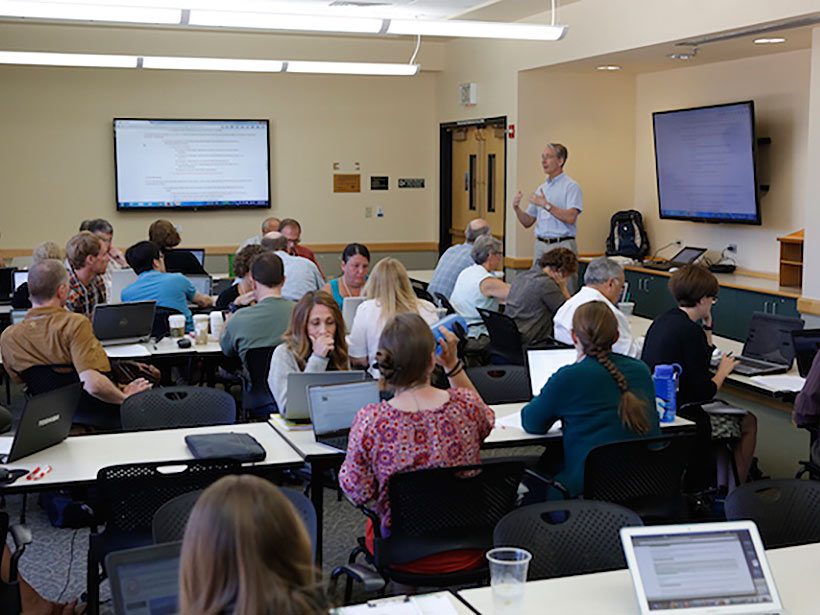The first ever Earth Educators’ Rendezvous brought together more than 300 professionals: geoscientists, psychologists, and academic faculty in the physical and social sciences and the humanities. The rendezvous provided a previously lacking venue for interaction between geoscience education researchers and the faculty who use this research in their teaching.
The rendezvous provided a previously lacking venue for interaction between geoscience education researchers and the faculty who use this research in their teaching.
We focused on our role as educators and sought to improve opportunities for undergraduate students to learn about Earth. We examined courses with strong pedagogy and design that are grounded in research and that link learning about Earth to its societal context, as well as programs designed to maximize the success of all students.
The rendezvous was organized around geoscience education research results and their application in the classroom, practical knowledge for teaching geoscience, and strengthening geoscience programs. Many attendees played multiple roles in the program, a dynamic mix of workshops, working groups, plenary sessions, oral and poster sessions, and a concluding town hall meeting.
Cognitive psychologist Nora Newcombe delivered the opening plenary session on the critical roles that cognitive science and geoscience education research (GER) can play in guiding instruction. Presentations, workshops, and an National Science Foundation–funded activity characterizing GER results brought participants up to date on research highlights, informed future research agendas, provided opportunities for increasing research skills, and recommended strategies for building a stronger GER community (e.g., developing a research methods “toolbox” for new GER workers).

Research findings on learning in the field, instructional strategies that promote conceptual change, and development of spatial thinking are important sources of information for faculty, as is information from other faculty on what is working in their teaching. Thus, many participants attended in order to interact with other faculty and to learn how they teach different aspects of the geosciences. The rendezvous enabled this by offering sessions on course design, availability and use of large data sets, and teaching controversial topics.
Knowledgeable faculty and strong geoscience education research are necessary but are not sufficient to provide the educational opportunities needed for an Earth-literate public and a workforce that can address environmental challenges and resource needs. We must also have strong degree programs, supportive learning environments for students, teachers who can prepare and encourage younger students to pursue geoscience, and the ability to reach out to students who will never take a geoscience course. Rendezvous sessions covered strategies for supporting diverse students, the role of systems thinking, preparing future teachers, and strategies for program design. The importance of context in making science concepts accessible to all was of wide interest.
Participants at the concluding town hall meeting emphasized the value of the rendezvous as an opportunity to share, learn, and network. They stressed the importance of teaching that engages students in learning, they felt empowered and energized to try different approaches, and they recommended the rendezvous website as a resource for others interested in learning more.
Attendees gained insight into the role of societal context in enhancing learning.
Attendees gained insight into the role of societal context in enhancing learning, the promise of the Next Generation Science Standards for increasing learning about Earth, and the importance of departments in supporting student and faculty learning. Registration is now open for the 2016 Earth Educators’ Rendezvous, to be held 18–22 July in Madison, Wis.
This meeting was organized by the On the Cutting Edge and Interdisciplinary Teaching about Earth for a Sustainable Future (InTeGrate) projects and was supported by participant registrations; contributions from the American Geophysical Union, the Geological Society of America, and the National Association of Geoscience Teachers; and grants from the National Science Foundation.
—Cathryn A. Manduca, Science Education Resource Center, Carleton College, Northfield, Minn.; email: [email protected]; R. Heather Macdonald, Department of Geology, College of William and Mary, Williamsburg, Va.; and Laurel Goodell, Department of Geosciences, Princeton University, Princeton, N.J.
Citation: Manduca, C. A., R. H. Macdonald, and L. Goodell, (2016), Learning about teaching: Geoscience educators share insights, Eos, 97, doi:10.1029/2016EO049397. Published on 1 April 2016.
Text © 2016. The authors. CC BY-NC 3.0
Except where otherwise noted, images are subject to copyright. Any reuse without express permission from the copyright owner is prohibited.

